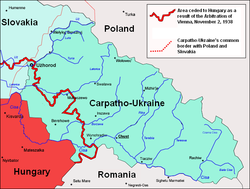
For diasporic groups, how much of their self-determination occurs within the nation-state they live in, and how much is the result of larger forces?
I wrote elsewhere that
In a general discussion of diasporas, James Clifford (1994:304-5) lists five criteria as normally being seen as central: (1) a group is displaced from a 'homeland' and has (2) not been assimilated into their host country. The group has (3) a collective identity which is influenced by their (4) support for the homeland, and (5) a wish to return there.
For Ruthenians, diaspora can mean two things. It can refer to groups that live outside of the ´homeland´, and who have either emigrated or have been forced to move to other areas. Diaspora can in addition refer to the division of the homeland between different states. Communication over borders has been difficult, particularly during the last two generations. This has led groups to be isolated from each other, even though the physical distance between them isn´t large. An international Ruthenian conference held in Budapest last week called for greater Ruthenian/Rusyn self determination in the various nations they live in. The conference was organized on the 70th anniversary of the declaration of an independent Carpatho-Ukraine republic, which lasted only one day before being invaded by Hungary in March 1939.
An international Ruthenian conference held in Budapest last week called for greater Ruthenian/Rusyn self determination in the various nations they live in. The conference was organized on the 70th anniversary of the declaration of an independent Carpatho-Ukraine republic, which lasted only one day before being invaded by Hungary in March 1939.
According to the UA-reporter.com, one of the conference participants (Russian State Duma deputy Konstantin Zatulin) said that because Rusyns are the fourth-largest Eastern Slavic people - after the Russians, Ukrainians and Belarusians - "It is our Slavonic honor to make sure that the people do not feel any deprivation". While most countries with sizable Rusyn populations have granted this group the status of indigenous people, the Ukraine refuses to do this. In December 2008, strong voices were raised by Rusyns in western Ukraine to declare independence once again. Zatulin commented on this in another interview last week, saying that “But if you remember how conflicts in Abkhazia, Ossetia, Transdniester and Karabakh started – there are some worrying analogies. The logic is clear – if we demand independence, we might stand a chance to get at least autonomy.”
No comments:
Post a Comment